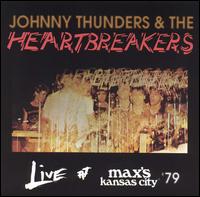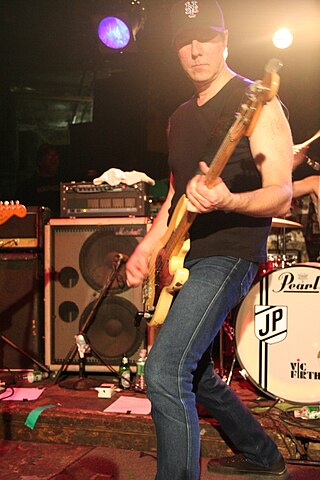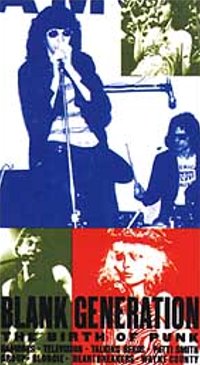Related Research Articles

Douglas Glenn Colvin, better known by his stage name Dee Dee Ramone, was an American musician. He was the bassist and a founding member of the punk rock band Ramones. Throughout the band's existence, he was the most prolific lyricist and composer, writing many of their best-known songs, such as "53rd & 3rd", "Chinese Rock", "Commando", "Wart Hog", "Rockaway Beach", "Poison Heart" and "Bonzo Goes To Bitburg". The latter won the New York Music Award for best independent single of the year in 1986, while Animal Boy, which the song is from, won for best album.

End of the Century is the fifth studio album by the American punk rock band Ramones, released on February 4, 1980, through Sire Records. The album was the band's first to be produced by Phil Spector, though he had offered the band his assistance earlier in their career. With Spector fully producing the album, it was the first release that excluded original member Tommy Ramone, who had left the band in 1978 but had produced their previous album Road to Ruin. Spector used more advanced standards of engineering, such as high-quality overdubbing and echo chambers. These painstaking methods caused conflict between the band and Spector since the Ramones were accustomed to a quicker recording process. Spector emphasized the production value as well, working with a budget of around $200,000, far exceeding their earlier album sessions.

John Anthony Genzale, known professionally as Johnny Thunders, was an American guitarist, singer and songwriter. He came to prominence in the early 1970s as a member of the New York Dolls. He later played with the Heartbreakers and as a solo artist.
The Heartbreakers, sometimes referred to as Johnny Thunders' Heartbreakers, were an American punk rock band formed in New York City in 1975. The band spearheaded the first wave of punk rock.

Marc Steven Bell is an American drummer. He began playing in hard rock bands in the New York City area, notably Dust and Estus. He was asked to drum for punk rock band Richard Hell and the Voidoids. He replaced drummer Tommy Ramone in the Ramones in 1978, and went by the stage name Marky Ramone from then on. He has also played drums for other punk rock and heavy metal bands, including his own band Marky Ramone and the Intruders. He continues to keep the Ramones legacy alive around the world with his band Marky Ramone's Blitzkrieg.

Halfway to Sanity is the 10th studio album by American punk band the Ramones, and their last album to feature drummer Richie Ramone. It was produced by Daniel Rey and released on September 15, 1987, by Sire Records. Recording sessions began that April at Intergalactic Studios in New York City, with the band recording instruments before vocals in order to learn songs more quickly. It fared well on charts outside the United States, but peaked at No. 172 on the Billboard 200.

Sid Sings is the first released solo live album by English punk rock musician Sid Vicious. It was released posthumously on December 15, 1979 and peaked at number 30 on the British album charts.
Gerard "Jerry" Nolan was an American rock drummer, best known for his work with the New York Dolls and The Heartbreakers.

Richard Reinhardt is an American drummer best known by his stage name Richie Ramone, and for being the drummer for the punk band the Ramones from February 1983 until August 1987. As of 2022, he is one of the four surviving members of the band.

Subterranean Jungle is the seventh studio album by the American punk rock band the Ramones, released by Sire Records on February 23, 1983. Overall, the album featured a return to a somewhat more hard punk rock style compared to the band's previous two albums End of the Century in 1980, and Pleasant Dreams in 1981, which were the most pop-focused of the band's career. This direction was encouraged by guitarist Johnny Ramone. The recording sessions saw disputes between band members, mainly due to struggles with alcohol addiction by Joey Ramone and Marky Ramone, and the drug addiction of Dee Dee Ramone.

L.A.M.F. is the only studio album by the American punk rock band The Heartbreakers, which included Johnny Thunders, Jerry Nolan, Walter Lure and Billy Rath. It was released on October 3, 1977 by the British independent record label Track Records, and the music of the album is a mixture of punk and rock and roll.

Live at Max's Kansas City is a live album by The Heartbreakers. Recorded at a "reunion"/"farewell" show on September 16, 1978 at the famous Max's Kansas City nightclub, the album's performance — loud, sloppy, and laden with bawdy introductions and/or lyric changes to many of the familiar songs from their only studio album, L.A.M.F. — further cemented the band's live reputation. A classic of early punk rock, the album has been called "probably the best official document of any New York band of the era."

Andy Shernoff is an American musician, songwriter and record producer.
Daniel Rey is an American musician, record producer and songwriter from New York City, best known for his work with the punk rock band Ramones.

Stations of the Cross is a Johnny Thunders album recorded over two sets at The Mudd Club in New York on September 30, 1982. Film director Lech Kowalski had originally planned to record a live Johnny Thunders performance for his movie, Stations of the Cross. The spoken dialogue was recorded at the Carlton Arms Hotel, New York City, in Room 29, on August 25, 1982.

The Idols with Sid Vicious is a concert album of former Sex Pistols bassist Sid Vicious performing with The Idols; though recorded in September 1978, it wasn't released until 1993. Steve Dior provided a recording of this performance to the New Rose record label. It was originally released by the Fan Club division of New Rose. It was also released in Japan by Teichiku Records, under license from New Rose.

The Blank Generation (1976) is the earliest of the released DIY "home movies" of the 1970s punk rock scene in New York City. It was filmed by No Wave filmmaker Amos Poe and Patti Smith Group member Ivan Kral.
Walter Lure was an American rock guitarist and singer. He was a member of the rock group The Heartbreakers.

The Ramones were an American punk rock band that formed in the New York City neighborhood of Forest Hills, Queens, in 1974. They are often cited as the first true punk rock group. Despite only achieving limited commercial success during their time together, the band is today seen as highly influential.
"Too Much Junkie Business" is a song written by Walter Lure of the New York punk band the Heartbreakers. Johnny Thunders sometimes introduced it as "written by Chuck Berry, Bo Diddley, and Waldo (Lure)." The lyrics are a black-humored takeoff on Chuck Berry's "Too Much Monkey Business" (1956), about the complications of everyday life. Its melody is the New York Dolls' version of "Pills" by Bo Diddley. Thunders performed it often in his post-Heartbreakers career. Lure has said that he let Thunders take co-writing credit because "he liked it so much and he wished he’d wrote it".
References
- Legs McNeil and Gillian McCain, Please Kill Me: The Uncensored Oral History of Punk.
- Dee Dee Ramone with Veronica Kaufmann, Lobotomy: Surviving the Ramones.
- Richard Hell, Citizine interview by Mark Prindle